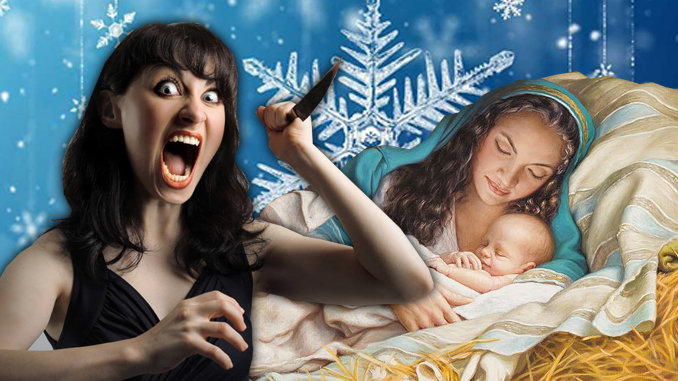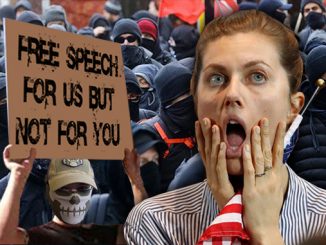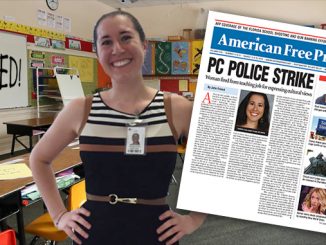
Gay apparel, “White Christmas,” and “Santa Baby” are simply too insensitive for today’s snowflakes of all persuasions, as John Whitehead points out in the related story, below. Never mind these have been American holiday season standards for decades-plus, and, until recently, immigrants have managed to endure such unbearable insults as part of integrating with their new homelands.
By S.T. Patrick
Citing the lyrics as “manipulative and wrong,” Glenn Anderson of “Star 102 FM” in Cleveland explained why the station had decided to ban music on its station. The song to which Anderson was referring was not a profanity-laden rap song. Rather, Star 102 is in the middle of its Christmas music season, and they have decided to ban 1944’s “Baby, It’s Cold Outside.”
The Cleveland station activated the ban at the request of listeners who complained that the song was at odds with the #MeToo movement. Sparked by the Harvey Weinstein sexual abuse allegations, the #MeToo movement spread virally through social media as a way for women to speak out against sexual harassment and sexual assault.
“The world we live in is extra sensitive now, and people get easily offended,” Anderson said. “But, in a world where #MeToo has finally given women the voice they deserve, the song has no place.”
“Baby, It’s Cold Outside” was written in 1944 by Frank Loesser, who wanted to create a song that he and his wife could perform at parties. It is a call-and-response duet wherein the male suitor tries to persuade his female date to stay with him longer. It’s cold and the weather is dreadful, you see, so why don’t you just stay?
With no mention of Christmas, the wintry song has become a holiday staple on radio and in film. Loesser sold the song to MGM, which featured the duet in its 1949 film “Neptune’s Daughter.” Since then, the song has been covered many times by many acts, the most popular current version being a technical feat combining the voices of Dean Martin and Martina McBride. Lost in the argument is that the song is performed twice in the film. Ricardo Montalbán and Esther Williams perform the tune with the traditional roles intact, and Red Skelton and Betty Garrett later do the song with the roles reversed. It is Ms. Garrett’s character who tries to convince the male character, Skelton, to stay.
It is lines like, “Say, what’s in that drink? No cabs to be had out there,” and, “I simply must go; the answer is ‘no,’” that some have interpreted as alluding to potential rape.
Not all women agree, of course. Comedian Jen Kirkman has explained that the song’s plot is really about a woman who wants to stay but doesn’t know the classy way to do so. She has to put up a bit of an argument to maintain her reputation.
Cleveland Rape Crisis Center President and CEO Sondra Miller strongly disagrees.
“It really pushed the line of consent,” Ms. Miller told Fox News. “The character in the song is saying ‘no,’ and they’re saying, ‘Well, does no really mean yes?’ And I think in 2018 what we know is consent is ‘yes’ and if you get a ‘no,’ it means ‘no’ and you should stop right there.”
The Star 102 ban is not an isolated incident. A Hallmark Channel film executive decided that the “gay apparel” that is donned in “Deck the Halls” should be “fun apparel.”
The website “Mommyish” criticized “I Saw Mommy Kissing Santa Claus” for being “exceptionally gendered to an insane degree… . Santa is a willing participant in the adult sexual experience, but for some reason we’re only spying on mom here.”
There have been complaints that Eartha Kitt’s 1953 classic “Santa Baby” engages in something known as “slut shaming,” because the female voice is saving herself for Santa and frowns upon the idea of kissing other men between Christmases.
A minor political uproar occurred in December 2014 as “White Christmas” was sung at the New York City Christmas tree lighting, blocks away from where crowds had gathered to protest the police killing of a black man by the name of Eric Garner. Both sides wildly exaggerated this spat. Liberals condemned country singer Darius Rucker, who is black, for performing the song, and conservatives needlessly claimed that liberals all think the song is racist. Did Bing Crosby ever realize that, at the onset of the Cold War, he was singing a snowy ballad that had been written by a Russian immigrant?

Last year, a Danish primary school cancelled Christmas. Due to an influx of students with immigrant backgrounds, the head of a school in Graested, Denmark chose to cancel the traditional Christmas service so as to not offend children who are not Protestant. The same school did not cancel a “Syria Week,” where it immersed its Danish children in Middle Eastern culture and brought in immigrants to teach the lessons. Whether this offended Protestant children seemed to be of no concern to the administration.
It’s mindboggling that the PC (political correctness) police have now completely gelled with a new form of puritanism, which H. L. Mencken defined as “the fear that someone, somewhere may be having a good time—particularly after hitting the eggnog and offering up a ‘presumptive’ holiday greeting.”
There is still hope that the country has not gone mad. In an online poll constructed by Star 102, 94% of respondents disagreed with the ban and instructed the station to play the classic song.
S.T. Patrick holds degrees in both journalism and social studies education. He spent 10 years as an educator and now hosts the “Midnight Writer News Show.” His email is [email protected].
To a Nation of Snowflakes, Christmas Has Become Another Trigger Word
“This Christmas season finds us a rather bewildered human race. We have neither peace within nor peace without. Everywhere paralyzing fears harrow people by day and haunt them by night. Our world is sick with war; everywhere we turn we see its ominous possibilities. And yet, my friends, the Christmas hope for peace and goodwill toward all men can no longer be dismissed as a kind of pious dream of some utopian. If we don’t have goodwill toward men in this world, we will destroy ourselves by the misuse of our own instruments and our own power.”— Martin Luther King, Jr., “A Christmas Sermon on Peace”
By John W. Whitehead
To a nation of snowflakes, Christmas has become yet another trigger word.
The latest Christmas casualties in the campaign to create one large national safe space are none other than the beloved animated classic “Rudolph the Red-Nosed Reindeer” (denounced for promoting bullying and homophobia) which first aired on television on December 6, 1964, and the Oscar-winning tune “Baby, It’s Cold Outside” (accused of being a date rape anthem) crooned by everyone from Dean Martin to Will Ferrell and Zooey Deschanel in the movie “Elf.”
Also on the endangered species Christmas list are such songs as “Deck the Halls” (it supposedly promotes “gay” apparel), “Santa Baby” (it has been denounced for “slut shaming”), and “White Christmas” (perceived as being racist).
One publishing company even re-issued their own redacted version of Clement Clarke Moore’s famous poem “Twas the night before Christmas” in order to be more health conscious: the company edited out Moore’s mention of Santa smoking a pipe (“The stump of a pipe he held tight in his teeth, / And the smoke, it encircled his head like a wreath.”)
Oh the horror.
After a year plagued with its fair share of Scrooges and Grinches and endless months of being mired in political gloom and doom, we could all use a little Christmas cheer right now.
Unfortunately, the politically charged Right and Left have been trying to score points off each other for so long, using whatever means available, that even Christmas has been weaponized.
Yet just because the War on Christmas has been adopted as a war cry by Donald Trump doesn’t mean that it’s not real.
Look around you.
When I was a child in the 1950s, the magic of Christmas was promoted in the schools. We sang Christmas carols in the classroom. There were cutouts of the Nativity scene on the bulletin board, along with the smiling, chubby face of Santa and Rudolph. We were all acutely aware that Christmas was magic.
Fast-forward to the present day, and there is a phobia surrounding Christmas that has turned it into fodder for the politically correct culture wars.
Indeed, in its “Constitutional Q&A: Twelve Rules of Christmas,” The Rutherford Institute points out that some communities, government agencies and businesses have gone to great lengths to avoid causing offense over Christmas.
Examples abound.
Schools across the country now avoid anything that alludes to the true meaning of Christmas such as angels, the baby Jesus, stables and shepherds.
In many of the nation’s schools, Christmas carols, Christmas trees, wreaths and candy canes have also been banned as part of the effort to avoid any reference to Christmas, Christ or God. One school even outlawed the colors red and green, saying they were Christmas colors and, thus, illegal.
Students asked to send seasonal cards to military troops have been told to make them “holiday cards” and instructed not to use the words “Merry Christmas” on their cards.
Many schools have redubbed their Christmas concerts as “winter holiday programs” and refer to Christmas as a “winter festival.” Some schools have cancelled holiday celebrations altogether to avoid offending those who do not celebrate the various holidays.
In Minnesota, a charter school banned the display of a poster prepared to promote the school’s yearbook as a holiday gift because the poster included Jack Skellington from Tim Burton’s The Nightmare Before Christmas and other secular Christmas icons, not to mention the word “Christmas.”
In New Jersey, one school district banned traditional Christmas songs such as “Joy to the World” and “Silent Night” from its holiday concerts. A New Jersey middle school cancelled a field trip to attend a performance of a play based on Charles Dickens’s “A Christmas Carol” because some might have found it “offensive.”
In Texas, a teacher who decorated her door with a scene from “A Charlie Brown Christmas,” including a scrawny tree and Linus, was forced to take it down lest students be offended or feel uncomfortable.
In Connecticut, teachers were instructed to change the wording of the classic poem “Twas the Night Before Christmas” to “Twas the Night Before a Holiday.”
In Virginia, a high school principal debated about whether he could mention Santa or distribute candy canes given that they were symbols of Christmas.
In Massachusetts, a fourth-grade class was asked to list 25 things that reminded them of Christmas. When one young student asked if she could include “Jesus,” her teacher replied that she could get fired if Christmas’ namesake appeared on the list.
Things are not much better outside the schools.
In one West Virginia town, although the manger scene (one of 350 light exhibits in the town’s annual Festival of Lights) included shepherds, camels and a guiding star, the main attractions—Jesus, Mary and Joseph—were nowhere to be found due to concerns about the separation of church and state.
In Chicago, organizers of a German Christkindlmarket were informed that the public Christmas festival was no place for the Christmas story. Officials were concerned that clips of the film “The Nativity Story,” which were to be played at the festival, might cause offense.
In Delaware, a Girl Scout troop was prohibited from carrying signs reading “Merry Christmas” in their town’s annual holiday parade.
While the First Amendment Establishment Clause prohibits the government from forcing religion on people or endorsing one particular religion over another, there is no legitimate legal reason why people should not be able to celebrate the season freely or wish each other a Merry Christmas or even mention the word Christmas.
The Rutherford Institute’s “Twelve Rules of Christmas” guidelines are helpful in dealing with folks who subscribe to the misguided notion that the law requires anything Christmas in nature be banned from public places.
Yet here’s the thing about this so-called War on Christmas that people don’t seem to get: while Christmas may be the “trigger” for purging Christmas from public places, government forums and speech—except when it profits Corporate America—it is part and parcel of the greater trend in recent years to whittle away at free speech and trample the First Amendment underfoot.
Claiming to promote tolerance and diversity while seeking a homogeneous mindset, many workplaces, schools and public places have become intolerant of any but the most politically correct viewpoints.
Anything that might raise the specter of controversy is avoided at all costs.
We are witnessing the emergence of an unstated yet court-sanctioned right, one that makes no appearance in the Constitution and yet seems to trump the First Amendment at every turn: the right to not be offended.
In this way, emboldened by phrases such as “hate crimes,” “bullying,” “extremism” and “microaggressions,” free speech has been confined to carefully constructed “free speech zones,” criminalized when it skates too close to challenging the status quo, shamed when it butts up against politically correct ideals, and muzzled when it appears dangerous.
This is censorship, driven by a politically correct need to pander to those who are easily offended.
Where you see this “safe space” mindset really play out is in the nation’s public schools, which continue to adopt policies—such as zero tolerance policies—that promise to steer young people clear of anything that even hints at danger, controversy or non-politically correct thinking.
Unfortunately, all too often it is common sense and individual liberty that get trampled underfoot: a student gets suspended under the school’s zero tolerance policy against drugs for chewing on a Certs breath mint; a kindergartner is suspended under the school’s zero tolerance policy against violence for playing a make-believe game of cops and robbers using his finger as a gun; and a school trip to see “A Christmas Carol” is cancelled because of the school’s zero tolerance policy against anything that is in any way offensive.
What’s worse, the motto today seems to be “When in doubt, throw it out.”
At the slightest hint of trouble, government officials (and corporations) are inclined to chuck anything that might be objectionable. So whereas Mark Twain’s classic Huckleberry Finn used to at least make the list of banned books every year, it now rarely even makes an appearance on school reading lists. It has been scrubbed out of existence.
See how that works?
Zero tolerance policies are ultimately about programming people into compliance with the government’s dictates.
The government doesn’t care about Christmas. It cares about control.
By government, I’m talking about the entrenched government bureaucracy that really calls the shots no matter what political party controls Congress and the White House.
Never forget, the police state wants us to be a nation of snowflakes, snitches and book burners: a legalistic, intolerant, elitist, squealing bystander nation willing to turn on each other and turn each other in for the slightest offense.
All of the petty sniping over Melania Trump’s red-themed Christmas decorations?
That plays perfectly into the Deep State’s efforts to keep the citizenry at odds with each other and incapable of presenting a united front against the threats posed by the government and its cabal of Constitution-destroying agencies and corporate partners.
You want to know why this country is in the state it’s in?
As I make clear in my book Battlefield America: The War on the American People, the answer is the same no matter what the problem might be, whether it’s the economy, government corruption, police brutality, endless wars, censorship, falling literacy rates, etc.: every one of these problems can be sourced back to the fact that “we the people” have stopped thinking for ourselves and relinquished responsibility for our lives and well-being to a government entity that sees us only as useful idiots.
The Greek philosopher Socrates believed in teaching people to think for themselves and in the free exchange of ideas. For his efforts, he was accused of corrupting the youth and was put to death. However, his legacy lived on in the Socratic method of teaching: posing questions that help young and old discover the answers by learning to think for themselves.
Now even the Socratic method is in danger of extinction.
As Rod Serling, creator of the classic sci-fi series Twilight Zone and one of the most insightful commentators on human nature, once observed, “We’re developing a new citizenry. One that will be very selective about cereals and automobiles, but won’t be able to think.”
We face an immense threat in our society from this drive to obliterate our history and traditions in order to erect a saccharine view of reality. In the process, we are creating a schizophrenic world for our children to grow up in, and it is neither healthy nor will it produce the kind of people who will be able to face the challenges of a future ruled by a totalitarian regime.
You can’t sanitize reality. You can’t scrub out of existence every unpleasant thought or idea. You can’t legislate tolerance. You can’t create enough safe spaces to avoid the ugliness that lurks in the hearts of men and women. You can’t fight ignorance with the weapons of a police state.
What you can do, however, is step up your game.
Opt for kindness over curtness, and civility over censorship. Choose peace over politics, and freedom over fascism. Find common ground with those whose politics or opinions or lifestyles may not jive with your own.
Do your part to make the world a little brighter and a little lighter, and maybe, just maybe, we’ll have a chance of digging our way out of this hole.
Constitutional attorney and author John W. Whitehead is founder and president of The Rutherford Institute. His 2015 book Battlefield America: The War on the American People and Government of Wolves: The Emerging American Police State are available at the AFP Online Store. Whitehead can be contacted at [email protected].





